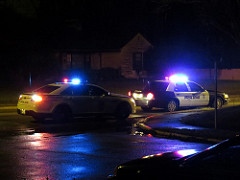When is a Traffic Stop Prolonged?

The Utah Supreme Court addressed whether cops can runs identification checks when conducting a traffic stop. In the case before them, Martinez was the passenger in a car that was stopped for failing to properly signal a lane change. Utah Highway Patrol Trooper Horne stopped the car and asked the driver for his license, vehicle registration, and proof of insurance, and he also asked Martinez for identification. Trooper Horne conducted a records check for the driver and Martinez and learned that Martinez had an outstanding arrest warrant. After a few minutes, Trooper Horne returned to the car and arrested Martinez. Martinez admitted that he had something illegal on him, and he produced a glass pipe that later tested positive for methamphetamine. Martinez was charged with possession of a controlled substance and possession of drug paraphernalia. Martinez moved to suppress the evidence, and the district court granted his motion. It concluded that Trooper Horne violated Martinez’s Fourth Amendment rights when he asked to see Martinez’s identification because investigation of the passenger without reasonable suspicion of criminal activity is beyond the scope of a routine traffic stop.
However, the Supreme Court of Utah disagreed and said that an officer does not violate the Fourth Amendment if he or she requests that a passenger voluntarily provide identification and then runs a background check on that passenger without reasonable suspicion that the passenger has committed, or is about to commit, a crime. To decide whether police conduct during a traffic stop is reasonable, the Supreme Court of Utah considered whether the stop was justified at its inception and carried out in a manner reasonably related in scope to the circumstances that justified the interference in the first place. A lawful traffic stop can become unreasonable if it is prolonged beyond the time reasonably required to complete that mission.
The Court explained that reasonable officer safety measures are related to the mission and the scope of a traffic stop. Traffic stops are especially fraught with danger to police officers, so officers may need to take certain negligibly burdensome precautions to complete their missions safely. Also, this danger could be greater when there are passengers in addition to the driver in the stopped car. Passengers present a risk to officer safety equal to the risk presented by the driver. Additionally, the Court did not believe that the five extra seconds it took to check Martinez’s record did not unreasonably prolong the length of time of the traffic stop. The five second time extension flowed from Martinez’s voluntary compliance with Trooper Horne’s request for identification. Thus, the district court’s decision was reversed and remanded.




